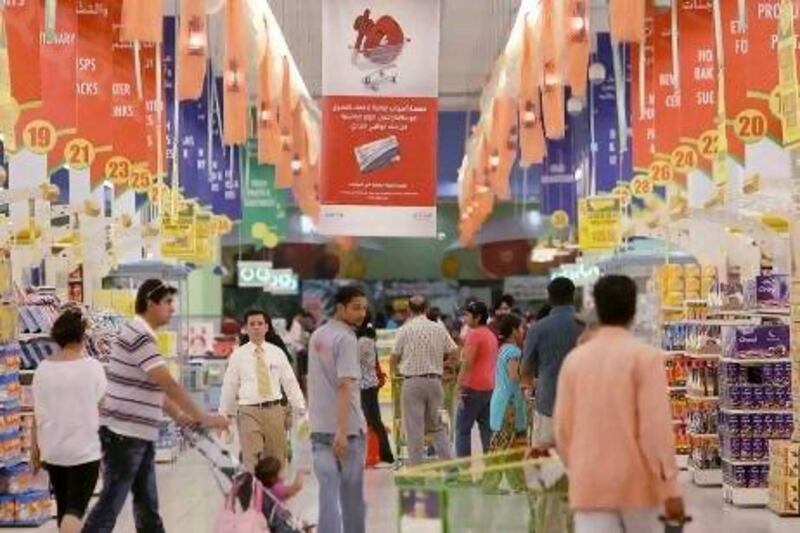Abu Dhabi shoppers are feeling the pinch after prices of basic food items from meat to coffee surged in the first two months of the year.
The rises come despite government price controls aimed at protecting consumers from higher food costs.
Shoppers should brace themselves for further rises, said Giyas Gokkent, the chief economist at National Bank of Abu Dhabi.
"There could be some acceleration in food prices," he said. "Oil prices are high and that does not bode well for global food prices, and in Abu Dhabi there is a lot of pent-up price pressure."
Meat prices rose 12.3 per cent in January and last month compared with the first two months of last year, according to data released by the Statistics Centre Abu Dhabi. Coffee, tea and cocoa prices advanced 8.4 per cent over the same period. Fish and seafood prices rose 6.9 per cent, while oils and fats climbed 6.1 per cent. Bread and cereals rose 4.4 per cent, the data showed.
Food and non-alcoholic beverage prices increased 2.6 per cent last month from February last year, but dipped 1.2 per cent compared with January. Weakness within the property market, the biggest component of the consumer price index, is helping to keep a lid on higher overall inflation. Inflation rose 0.6 per cent last month from the same month last year. Inflation slipped by 0.1 per cent from January.
Consumers, however, have often complained that the overall inflation rate does not reflect how much they are paying for their weekly food shopping.
Shoppers yesterday said prices in supermarkets had increased in the past 18 months, despite government intervention in the market. The Ministry of Economy in May agreed with retailers to fix prices of 400 commodities at 70 retail outlets across the country until the end of the year.
"We have heard that some of the prices are fixed for the daily commodities, which has improved because the retailers cannot increase the price," said Musthafa Kalaparambath, a sales executive who was shopping in LuLu. "But of course meat prices have gone up, as well as milk, rice, these are the main commodities that we buy. Most things the prices have gone up."
Radha Sridhar, a housewife with two children, said her monthly shopping bill had increased 20 per cent to Dh7,000 (US$1,905).
"It has definitely gone up," she said. "I think the oil price has gone up and the transport and labour costs have changed. If you take eatables and consumables, they have all gone up exorbitantly."
Despite the sharp rise in food inflation in the first two months of the year compared with a year earlier, retailers said they had not increased prices on the shelves.
Both LuLu Hypermarket and Fathima Supermarket said they had agreed to fix the prices of basic food commodities for the past six months.
"We have in fact kept prices more or less stable," said V Nandakumar, a spokesman for LuLu. "Yes, in the market there's been price increases but we have made a commitment to the UAE and the Government to keep prices low. A lot of products are imported so any price changes globally are bound to affect prices here."
Rises in food prices in Abu Dhabi mirror the global outlook for food costs. Higher costs of sugar, oils and cereals drove average food prices 1 per cent higher last month, the second consecutive monthly increase, according to the UN's Food and Agriculture Organisation.
"Increased imports due to a weaker US dollar and plunging freight rates have also characterised world markets since the beginning of 2012. This, combined with unfavourable weather conditions in major exporting countries, has supported world prices in recent weeks," the agency saidlast week.
[ rjones@thenational.ae ]





